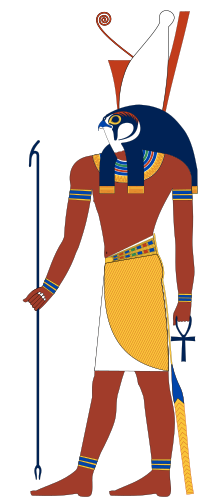
Back Horus Afrikaans Horus ALS حورس Arabic حورس ARZ Horus AST Hor (tanrı) Azerbaijani Horus BAR Хор (бажаство) Byelorussian Хор (бог) Bulgarian হোরাস Bengali/Bangla
| Horus | |||
|---|---|---|---|
 Horus was often the ancient Egyptians' national tutelary deity. He was usually depicted as a falcon-headed man wearing the pschent, or a red and white crown, as a symbol of kingship over the entire kingdom of Egypt. | |||
| Name in hieroglyphs |
| ||
| Major cult center | Nekhen, Edfu[1] | ||
| Symbol | Eye of Horus | ||
| Personal information | |||
| Parents | Osiris and Isis, Osiris and Nephthys,[2] Hathor[3] | ||
| Siblings | Anubis,[a] Bastet[b] | ||
| Consort | Hathor, Isis, Serket[4] Nephthys[2] | ||
| Offspring | Ihy, Four Sons of Horus (Horus the Elder) | ||
| Equivalents | |||
| Greek equivalent | Apollo | ||
| Nubian equivalent | Mandulis | ||
Horus, also known as Heru, Har, Her, or Hor[5] in Ancient Egyptian, is one of the most significant ancient Egyptian deities who served many functions, most notably as the god of kingship, healing, protection, the sun, and the sky. He was worshipped from at least the late prehistoric Egypt until the Ptolemaic Kingdom and Roman Egypt. Different forms of Horus are recorded in history, and these are treated as distinct gods by Egyptologists.[6] These various forms may be different manifestations of the same multi-layered deity in which certain attributes or syncretic relationships are emphasized, not necessarily in opposition but complementary to one another, consistent with how the Ancient Egyptians viewed the multiple facets of reality.[7] He was most often depicted as a falcon, most likely a lanner falcon or peregrine falcon, or as a man with a falcon head.[8]
The earliest recorded form of Horus is the tutelary deity of Nekhen in Upper Egypt, who is the first known national god, specifically related to the ruling pharaoh who in time came to be regarded as a manifestation of Horus in life and Osiris in death.[6] The most commonly encountered family relationship describes Horus as the son of Isis and Osiris, and he plays a key role in the Osiris myth as Osiris's heir and the rival to Set, the murderer and brother of Osiris. In another tradition, Hathor is regarded as his mother and sometimes as his wife.[6]
Claudius Aelianus wrote that Egyptians called the god Apollo "Horus" in their own language.[9] However, Plutarch, elaborating further on the same tradition reported by the Greeks; specified that the one "Horus" whom the Egyptians equated with the Greek Apollo was in fact "Horus the Elder", who is distinct from Horus the son of Osiris and Isis (that would make him "the Younger").[10]
- ^ Sims, Lesley (2000). "Gods & goddesses". A Visitor's Guide to Ancient Egypt. Saffron Hill, London: Usborne Publishing. p. 29. ISBN 0-7460-30673.
- ^ a b Lévai, Jessica (2007). Aspects of the Goddess Nephthys, Especially During the Graeco-Roman Period in Egypt. UMI. Archived from the original on 2023-04-03. Retrieved 2021-11-17.
- ^ Najovits, Simson R. (2003). Egypt, Trunk of the Tree, Vol. I: A Modern Survey of and Ancient Land. Algora Publishing. ISBN 978-0-87586-234-7. Archived from the original on 2023-04-03. Retrieved 2021-11-17.
- ^ Littleson, C. Scott (2005). Gods, Goddesses, and Mythology, Volume 4. Marshall Cavendish. ISBN 076147563X.
- ^ "Horus | Story, Appearance, Symbols, & Facts | Britannica". www.britannica.com. 2023-07-05. Retrieved 2023-08-02.
- ^ a b c "The Oxford Guide: Essential Guide to Egyptian Mythology", Edited by Donald B. Redford, Horus: by Edmund S. Meltzer, pp. 164–168, Berkley, 2003, ISBN 0-425-19096-X.
- ^ "The Oxford Guide: Essential Guide to Egyptian Mythology", Edited by Donald B. Redford, p106 & p165, Berkley, 2003, ISBN 0-425-19096-X.
- ^ Wilkinson, Richard H. (2003). The Complete Gods and Goddesses of Ancient Egypt. Thames & Hudson. p. 202.
- ^ "Aelian, Characteristics of Animals, 10.14". Archived from the original on 2020-08-06. Retrieved 2021-02-20.
- ^ "- Moralia, De Iside et Osiride (Isis and Osiris), 12. (356A)". Archived from the original on 2023-04-03. Retrieved 2022-08-16.
Cite error: There are <ref group=lower-alpha> tags or {{efn}} templates on this page, but the references will not show without a {{reflist|group=lower-alpha}} template or {{notelist}} template (see the help page).
© MMXXIII Rich X Search. We shall prevail. All rights reserved. Rich X Search